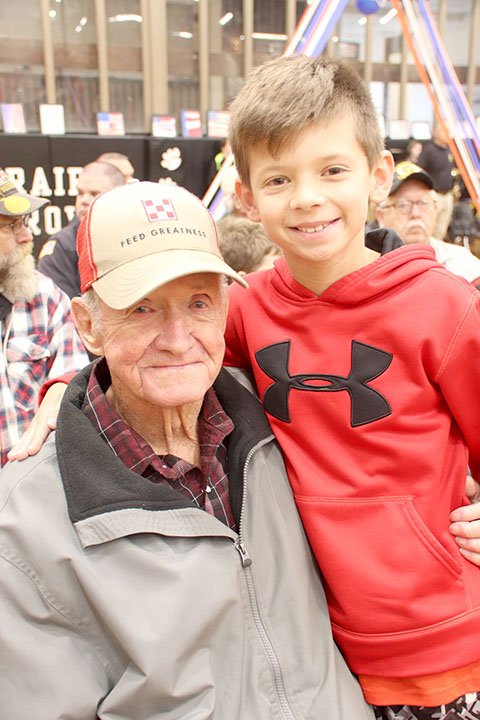PRAIRIE GROVE -- U.S. Army Staff Sgt. Bo Mitchell quoted scripture from the Bible on Friday as one way to describe a veteran.
Isaiah 6:8 says, "Then I heard the voice of the Lord saying, 'Whom shall I send? And who will go for us?' And I said, 'Here am I. Send me!'"
Mitchell, who is a school resource officer with Prairie Grove Police Department, said the Bible verse describes veterans, those who are willing to go and serve their country.
"The reason our great nation is the way it is today is because of our veterans," Mitchell said.
Mitchell was one of the guest speakers Friday for the annual Veterans Assembly at Prairie Grove Middle School. Each year students invite their parents, grandparents, great-grandparents or other family members to be honored at the assembly. The morning began with a veterans' breakfast in the cafeteria, a flag-raising ceremony and then the program in the middle school gym.
Mitchell served tours in Afghanistan and Iraq. He shared the story of one of his soldiers who had an impact on his life and displayed the courage of a veteran who was willing to go into combat and sacrifice for his country.
The young man, a 19-year-old named Andrew Hudgens, always volunteered for work and was one of the best soldiers Mitchell had been around. The squad was deployed to Afghanistan and Mitchell said Hudgens was on "cloud nine" because he believed the best way to serve would be to serve in war.
While there, Hudgens slipped and fell 40 feet and broke his wrist and fractured a hip. He headed home for surgery but told his fellow soldiers he would be back. Doctors told him he would not be able to return but Hudgens disagreed. Hudgens had surgery and went through rehabilitation services. During that time, he continued to write letters to his squad and send care packages.
"That's where his mind was and that's where his heart was," Mitchell said.
Hudgens was given the OK to return to combat and Mitchell said the young man had to make a choice between staying home with his family or returning to Afghanistan. He decided to return. Two weeks later, Hudgens was killed in combat.
Hudgens was the epitome of a soldier, Mitchell said. He showed loyalty, duty, respect, courage.
"I want to thank our soldiers because without you, we wouldn't be here today," Mitchell said, addressing those veterans sitting in front of him.
The second speaker for the program, Major Robert Anderson, retired from the U.S. Army in 1986 after serving for 20 years in a healthcare capacity. One of his jobs was to help supply needs to hospitals.
"It takes teamwork to make the Army work, to make the Air Force work and the Navy and Marines," Anderson said.
Anderson started with a historical perspective of Veterans Day, noting that after the sacrifice of more than 40 million lives, the fighting of the "war to end all wars" stopped on the 11th hour of the 11th day of the 11th month of 1918.
"In most of the world, this has been a week of somber, reflective ceremonies remembering the millions of lives that will culminate with parades and large memorial services in cemeteries and at war memorials to those that died," Anderson said.
Today, Veterans Day is used to honor all those who have served in the military at any time, Anderson said. Some were in combat units, some engaged in combat on foreign ground, some served supporting those in combat and many served in units ready to engage in combat. Many others served in the United States training for combat or to support combat.
Anderson served as a division medical supply officer and medical battalion logistics staff officer while in Vietnam in 1968 and 1969 with the Americal Division, or 23rd Infantry. From 1980 to 1986, he worked in planning and executing the modernization of the field medical equipment for the Army Medical Department.
He shared how members of the Army Medical Department provided healthcare, reconstructive surgery and rehabilitation services to millions of soldiers injured in combat. Many of the advances in military medicine have been passed onto the general public, including treatment of burns, immunizations and plastic surgery techniques and methodologies.
"I am here today to thank you for remembering all veterans," Anderson said.
He turned to the students and encouraged them to consider serving their country by becoming a member of the military forces.
"Service in the military is the ultimate of national service for our democracy," Anderson said.
General News on 11/14/2018
